|
|
|
Sort Order |
|
|
|
Items / Page
|
|
|
|
|
|
|
| Srl | Item |
| 1 |
ID:
103867
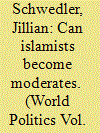

|
|
|
|
|
| Publication |
2011.
|
| Summary/Abstract |
Recent years have seen a surge of studies that examine the inclusion-moderation hypothesis with reference to political Islam: the idea that political groups and individuals may become more moderate as a result of their inclusion in pluralist political processes. Most of these interventions adopt one of three foci: (1) the behavioral moderation of groups; (2) the ideological moderation of groups; and (3) the ideological moderation of individuals. After a discussion of various definitions of moderate and radical, the concept of moderation, and the centrality of moderation to studies of democratization, the author examines the scholarship on political Islam that falls within each approach. She then examines several studies that raise questions about sequencing: how mechanisms linking inclusion and moderation are posited and how other approaches might better explain Islamist moderation. Finally, she offers a critical analysis of the behavior-ideology binary that animates many of these models and suggests some fruitful paths for future research.
|
|
|
|
|
|
|
|
|
|
|
|
|
|
|
|
| 2 |
ID:
095091
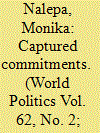

|
|
|
|
|
| Publication |
2010.
|
| Summary/Abstract |
How can outgoing autocrats enforce promises of amnesty once they have left power? Why would incoming opposition parties honor their prior promises of amnesty once they have assumed power and face no independent mechanisms of enforcement? In 1989 autocrats in a number of communist countries offered their respective oppositions free elections in exchange for promises of amnesty. The communists' decision appears irrational given the lack of institutions to enforce these promises of amnesty. What is further puzzling is that the former opposition parties that won elections in many countries actually refrained from implementing transitional justice measures. Their decision to honoring their prior agreements to grant amnesty seems as irrational as the autocrats' decisions to place themselves at the mercy of their opponents. Using an analytic narrative approach, the author explains this paradox by modeling pacted transitions not as simple commitment problems but as games of incomplete information where the uninformed party has "skeletons in its closet"-that is,embarrassing information that provides insurance against the commitments being broken. The author identifies the conditions under which autocrats step down even though they can be punished with transitional justice and illustrates the results with case studies from Czechoslovakia, Poland, and Hungary.
|
|
|
|
|
|
|
|
|
|
|
|
|
|
|
|
| 3 |
ID:
095085
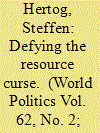

|
|
|
|
|
| Publication |
2010.
|
| Summary/Abstract |
The article explains how several Gulf rentier monarchies have managed to create highly profitable and well-managed state-owned enterprises (SOEs), confounding expectations of both general soe inefficiency and the particularly poor quality of rentier public sectors. It argues that a combination of two factors explains the outcome: the absence of a populist-mobilizational history and substantive regime autonomy in economic policy-making. The authors concludes that it is necessary to rethink the commonly accepted generalizations both about rentier states and, arguably, about public sectors in the developing world.
|
|
|
|
|
|
|
|
|
|
|
|
|
|
|
|
| 4 |
ID:
103866
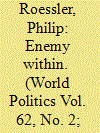

|
|
|
|
|
| Publication |
2011.
|
| Summary/Abstract |
Why do rulers employ ethnic exclusion at the risk of civil war? Focusing on the region of sub-Saharan Africa, the author attributes this costly strategy to the commitment problem that arises in personalist regimes between elites who hold joint control of the state's coercive apparatus. As no faction can be sure that others will not exploit their violent capabilities to usurp power, elites maneuver to protect their privileged position and safeguard against others' first-strike capabilities. Reciprocal maneuvering, however, reinforces suspicion and increases intrigue within the regime, undermining trust and often triggering a security dilemma. In the face of a rising internal threat, rulers move to eliminate their rivals to guarantee their personal and political survival. But the cost of such a strategy, especially when carried out along ethnic lines, is that it increases the risk of a future civil war. To test this argument, the author employs the Ethnic Power Relations data set combined with original data on the ethnicity of conspirators of coups and rebellions in Africa. He finds that in Africa ethnic exclusion substitutes civil war risk for coup risk. And rulers are significantly more likely to exclude their coconspirators-the very friends and allies who helped them come to power-than other included groups, but at the cost of increasing the risk of a future civil war with their former allies. In the first three years after being purged from the central government, coconspirators and their coethnics are sixteen times more likely to rebel than when they were represented at the apex of the regime.
|
|
|
|
|
|
|
|
|
|
|
|
|
|
|
|
| 5 |
ID:
103864
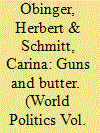

|
|
|
|
|
| Publication |
2011.
|
| Summary/Abstract |
Scholars from a number of disciplines have argued that the massive expansion of the welfare state in the postwar period was at least in some part a by?product of the cold war and the associated political competition between two rival regime blocs. However, the question of whether regime competition fuelled welfare-state growth has never been subject to systematic examination. Applying spatial econometrics, this article offers the first empirical test of this argument. The authors' findings support the notion that regime competition stimulated the expansion of the welfare state on both sides of the Iron Curtain in the postwar period.
|
|
|
|
|
|
|
|
|
|
|
|
|
|
|
|
| 6 |
ID:
095079
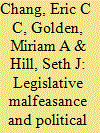

|
|
|
|
|
| Publication |
2010.
|
| Summary/Abstract |
Utilizing a unique data set from the Italian Ministry of Justice reporting the transmission to the Chamber of Deputies of more than the thousand requests for the removal of parliamentary immunity from deputies suspected of criminal wrongdoing, the authors analyze the political careers of members of the Chamber during the first eleven postwar legislatures (1948-94). They find that judicial investigation typically did not discourage deputies from standing for reelection in Italy's large multimember electoral districts. They also show that voters did not punish allegedly malfeasant legislators with loss of office until the last (Eleventh) legislature in the sample. To account for the dramatic change in voter behavior that occurred in the early 1990s, the investigation focuses on the roles of the judiciary and the press. The results are consistent with a theory that a vigilant and free press is a necessary condition for political accountability in democratic settings. An independent judiciary alone is ineffective in ensuring electoral accountability if the public is not informed of political malfeasance.
|
|
|
|
|
|
|
|
|
|
|
|
|
|
|
|
| 7 |
ID:
095088
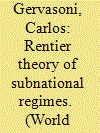

|
|
|
|
|
| Publication |
2010.
|
| Summary/Abstract |
Levels of subnational democracy vary significantly within countries around the world. Drawing on fiscal theories of the state, the author argues that this variance is often explained by a type of rentierism that is not geographically determined by natural resources but politically created by certain fiscal federalism arrangements. He posits that less democratic regimes are more likely in rentier provinces-those that receive disproportionately large central government transfers and practically forgo local taxation. Intergovernmental revenue-sharing rules that produce large vertical fiscal imbalances and favor the economically smaller districts provide their incumbents with generous "fiscal federalism rents" that allow them to restrict democratic contestation and weaken checks and balances. Statistical evidence from a panel data set of the Argentine provinces strongly confirms this expectation, even after controlling for standard alternative explanations such as level of development. Sensitivity analysis shows that this finding is extremely robust to alternative panel estimators. Qualitative and quantitative evidence suggests that the effect of heavy public spending on the economic autonomy of political actors is the main causal mechanism at work.
|
|
|
|
|
|
|
|
|
|
|
|
|
|
|
|
| 8 |
ID:
103865


|
|
|
|
|
| Publication |
2011.
|
| Summary/Abstract |
Why are unemployment benefits more generous in some countries? This article argues that citizens trade off the redistributive and insuring effect of social insurance. As a result, the distribution of risk in a society has important consequences via popular demand for social policy-making. At the microlevel, the article shows that, in addition to income, the risk of unemployment is a key predictor of individual-level preferences for unemployment benefits. Based on the microlevel findings, the article argues that at the macrolevel the homogeneity of the risk pool is an important determinant of benefit generosity: the more equally unemployment risk is distributed, the higher unemployment replacement rates are. Empirical testing at both levels finds support for this account of social policy by popular demand.
|
|
|
|
|
|
|
|
|
|
|
|
|
|
|
|
| 9 |
ID:
095082
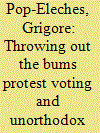

|
|
|
|
|
| Publication |
2010.
|
| Summary/Abstract |
The electoral rise of unorthodox parties (UOPs) in recent East European elections raises some puzzling questions about electoral dynamics in new democracies. Why did the power alternation of the mid-1990s not result in party-system consolidation, as suggested by some earlier studies, but instead give way to a much more chaotic environment in which established mainstream political parties lost considerable ground to new political formations based on personalist and populist appeals? Why did this reversal in Eastern Europe happen during a period of economic recovery, remarkable Western integration progress, and a broad acceptance of electoral democracy as the only game in town? This article suggests that these electoral dynamics can be explained by focusing on the interaction between protest voting and election sequence. While protest voting to punish unpopular incumbents has been a widespread but understudied practice since the collapse of communism, the beneficiaries of these protest votes have changed in recent elections. Whereas in the first two generations of postcommunist elections, disgruntled voters could opt for untried mainstream alternatives, in third-generation elections (defined as elections taking place after at least two different ideological camps have governed in the postcommunist period) voters had fewer untried mainstream alternatives, and therefore opted in greater number for unorthodox parties. This explanation receives strong empirical support from statistical tests using aggregate data from seventy-six parliamentary elections in fourteen East European countries from 1990 to 2006, survey evidence from twelve postcommunist elections from 1996 to 2004, and a survey experiment in Bulgaria in 2008.
|
|
|
|
|
|
|
|
|
|
|
|
|
|
|
|
| 10 |
ID:
103863
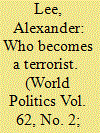

|
|
|
|
|
| Publication |
2011.
|
| Summary/Abstract |
Many studies of the social backgrounds of terrorists have found that they are wealthier and better educated than the population from which they are drawn. However, studies of political behavior have shown that all forms of political involvement are correlated with socioeconomic status. Among those who are politically active, opportunity costs may lead those involved in nonviolent activities to have a average social status than violent individuals with a similar ideological orientation. This article develops a theory of participation in violence that incorporates both opportunity costs and informational barriers to participation and tests it by comparing violent and nonviolent political activists involved in the anticolonial agitation in Bengal (1906-39) using data from their police files. While the Bengali terrorists are better educated and have higher status jobs than the population average, they are less educated and less wealthy than the nonviolent activists. These results suggest that socioeconomic status may play a substantial negative role in terrorist recruitment within elites.
|
|
|
|
|
|
|
|
|
|
|
|
|
|
|
|
|
|
|
|
|